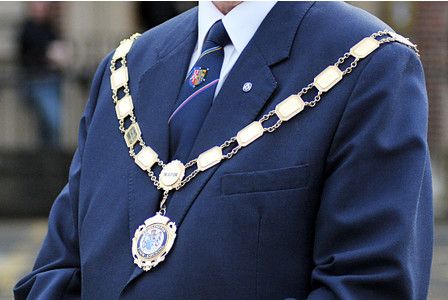RULES and Codes – what purpose and who do they serve?

Chain of bangles: Rules for making a case to municipal council are intimidating and process is archaic, says Jo
By Allan Baker in Oro Medonte
Rules and Codes in governance are commonly written in ambiguous language by lawyers and planners, seemingly for those who wish to rule. In decision making, politicians often use planners and lawyers to translate the language in which those rules are written. Even politicians who are also lawyers like to get a second legal opinion on those Rules and Codes to avoid a decision being taken to a higher power – the courts.
Some politicians make up their own rules. That group seems to share the same hair colour and obnoxious character and only hire lawyers after things go wrong. They then blame the lawyers and fire them. Either way the Rules and Codes clearly keep lawyers and planners gainfully employed.
Jo Average also frequently needs those translators when they wish to comply with or challenge municipal Rules and Codes. For Jo, those rules seem fuzzy with wording such as – will have regard for, will give consideration to, mitigate, etc. Instead of – will conform or comply with, reduce, or will not. Which is more easily understood?
Metaphorically, when a pitcher throws the baseball a batter has two choices, swing or not. Either way, the umpire makes a decisive call. That is a clear Rule. There may be some fuzziness as to the umpire’s interpretation of what he saw – “Get a pair of glasses Ump!” – but his call is absolute. His second opinion interpretors are the 1st and 3rd base Umps. Politicians and Umpires may both be disliked, but Canadian politicians are never fired.
Then there is agreement or not with the interpretation. The batter can accept the umpire’s judgement if he considers it fair, or he can challenge it. If his challenge is too vigorous he may be thrown out of the game. If the batter’s coach (interpreter) steps in to argue the case and is likewise too vigorous, he may be ordered out of the game too. The authority who understands or makes the Rules has the final word. The interpretation is the messy part. You can see where this is going.
Remember Jo? The Rules and Codes under which Jo must proceed in making his case to a municipal council can be confusing and intimidating, and the protocal is archaic. ROBERT wrote the rules a long time ago – the objective to maintain order and respect. Jo is required to appear in a formal setting, in front of a panel of elected officials with one person in the middle wearing a chain of bangles around his neck – all sitting behind a very large desk at an elevated floor level. The terminology used is also from some other time and place – Your Worship, His Honour, through your Worship to Councillor XYZ. Wouldn’t Sir, Mister, Ms., Member of Council, be respectful and serve everyone just as well?
Court Judges are appointed, municipal Council members are elected, and some might hold degrees. But it’s discretionary as to whether a Doctor or Professor, refers to themself with that distinction, or that others do in addressing them. Many candidates claimed to be just like Jo when they ran – did their election suddenly change their status and how they feel they should be addressed? I’ve seen Jo, out of uncertainty, bow in addressing municipal council. The proceedings obviously felt more like a Court Room than Council Chambers.
Rules and Codes should be created to serve a genuine need and written in terms which can be easily understood without the need for some profession to interpret them. ”For the People” to use a populist phrase.
“Cutting through the Red Tape” is also touted frequently. Is that because current Rules and Codes are outdated, no longer required, too restrictive, not protective enough – or too confusing? Professionals are well paid to find interpretive ways around the Rule provisions. I was told that legal wording is intended to prevent such loopholes and by a planner that “Every word counts”. Some politicians who don’t like the Rules simply ignore or change them. We gave them that power.
Whatever the reasons for eliminating, revising or creating new Rules and Codes, let’s make sure that they’re concise and easily understood by Jo Average. The municipal setting and the proceedings in which Jo can have discussion with his elected representatives should also be changed. Make it more welcoming, relevant and less cumbersome. Not a dumbing down, a sharpening up.
So what purpose and who do the rules, codes, and procedures serve? If it so pleases Your Worship, may I ask, Aren’t they For the People ?
Average Jo
From the outfield
Related:
Barbecuegate: Springwater councillors reject Principles Integrity report









Leave a Reply